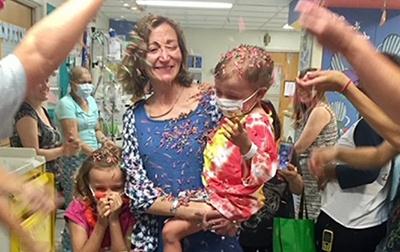The Division of Pediatric Transplant and Cellular Therapy offers cutting-edge transplantation and cell and gene therapies delivered by internationally recognized specialists.
The division has a strong commitment to advancing the translation of discoveries from bench-to-bedside and training the next generation of physician scientists.
About Us
The Division of Pediatric Transplant and Cellular Therapy (PTCT) in the Duke Department of Pediatrics is an internationally-renowned transplant program. Established in 1990 as one of the first dedicated pediatric transplant units, we have performed more than 2,500 transplants in children and young adults with over 100 unique diagnoses for patients from all over the world.
Our patients receive cutting-edge treatment for a variety of severe and life-threatening illnesses, including:
- cancer
- blood disorders
- immune deficiencies
- hemoglobinopathies
- certain inherited metabolic diseases
We have fully dedicated inpatient and outpatient programs which provide the highest quality of care to our patients. Our hepa-filtered inpatient unit is one of the largest in the country and is specifically designed to provide the best possible environment of care for immunocompromised patients.
We are focused on the unique needs of pediatric and young adult stem cell transplant, cellular therapy, gene therapy and high risk oncology patients. We have the capacity to deliver treatments requiring 1:1 nursing care from a staff trained and competent in chemotherapy, immunotherapy and complicated treatment regimens. We are also dedicated to educate and train the next generation of multidisciplinary clinicians and research investigators to advance the field.
Our faculty and staff are comprised of:
- board-certified transplant and immunotherapy experts
- hematology-oncology and transplant and cellular therapy fellows
- dedicated advanced practice providers (APPs)
- nurse and non-nurse clinical/research coordinators
- social workers
- inpatient and outpatient registered nurses
- pharmacists
- psychologists
- nutritionists
- physical therapists
- child life specialists
- translators
- family support program professionals
Our team also works closely with the full complement of Duke pediatric specialists to provide specialized care for patients who have additional medical problems or experience complications after transplantation.
Accreditation, Credentials and Affiliations
The Division of Pediatric Transplant and Cellular Therapy is:
- accredited by the Foundation for Accreditation of Cellular Therapy (FACT) since 2005
- a member of the National Marrow Donor Program since 1991
- contributing data to the Center for International Blood and Marrow Transplant Research (CIMBTR)
- a core center of the Blood and Marrow Transplant Clinical Trials Network (BMT CTN) since its establishment in 2001
- consistently ranked as one of the nation’s best hospitals by US News & World Report (Duke Children’s Hospital, and specifically, the subspecialty of pediatric cancer )
The division offers a rich and creative research environment involving collaborations with experts in multiple disciplines at the national and international levels, including:
- the Pediatric Transplantation and Cellular Therapy Network (PTCTN)
- Children’s Oncology Group (COG)
- Pediatric Acute Lung Injury and Sepsis Investigators (PALISI)
- Blood and Marrow Transplant Clinical Trials Network (BMT CTN)
- and other organizations
As a National Cancer Institute-designated Comprehensive Cancer Center and member of the National Comprehensive Cancer Network and the Leukodystrophy Care Network, we are dedicated to conducting ongoing research to improve patient outcomes.
The division is supported by the Duke Stem Cell Transplant Laboratory (FACT and CAP accredited and CLIA certified), the Carolinas Cord Blood Bank (an FDA licensed, FACT and CAP accredited public cord blood bank), and the Robertson GMP Cell Manufacturing Laboratory (FDA registered and FACT accredited).
The division collaborates with the Marcus Center for Cellular Cures which conducts discovery, IND enabling, laboratory-based, and translational research in the fields of transplantation and cellular therapies and provides multiple opportunities for fellows to be exposed to and gain skills in all aspects of transplant and cellular therapies research.


